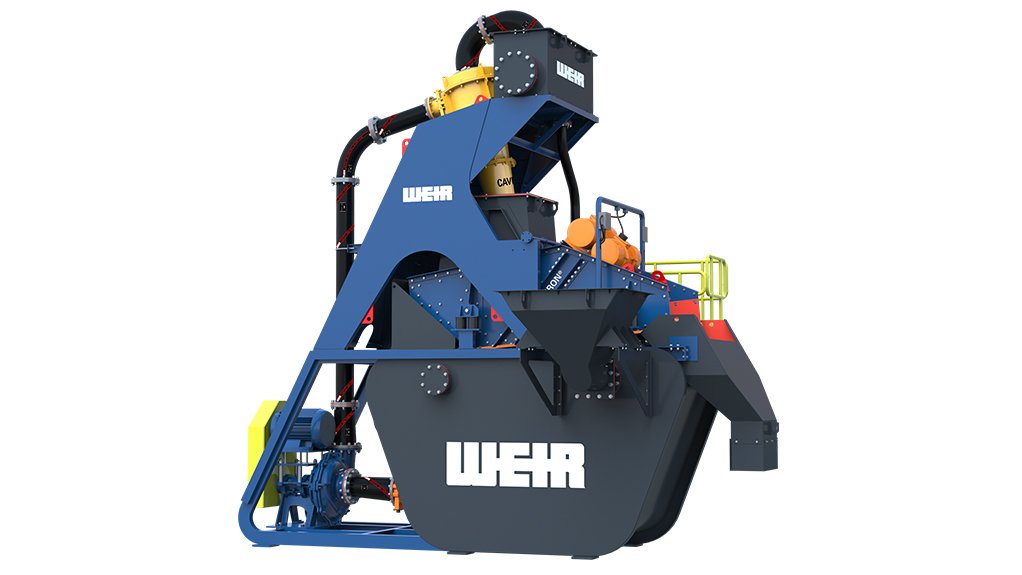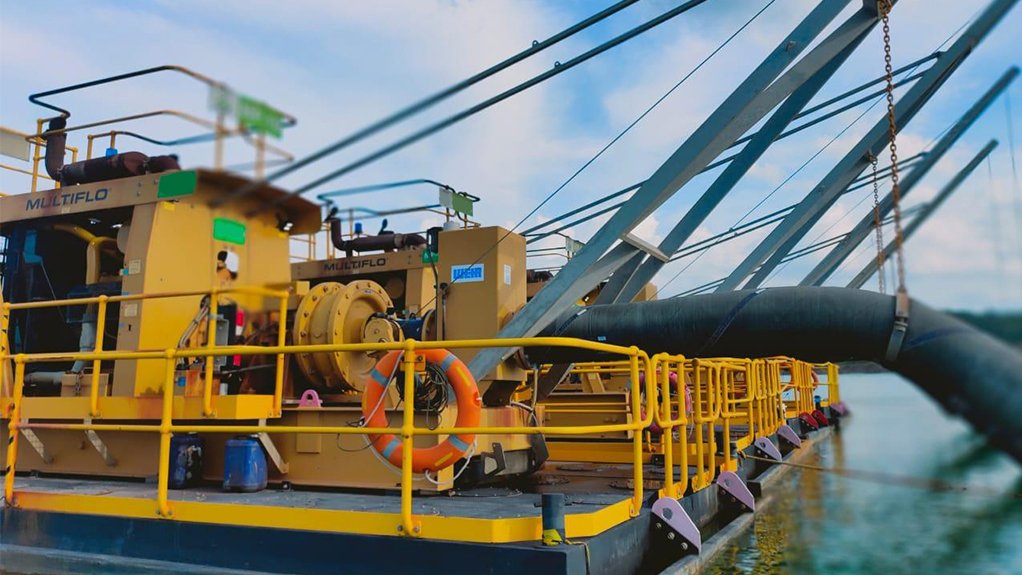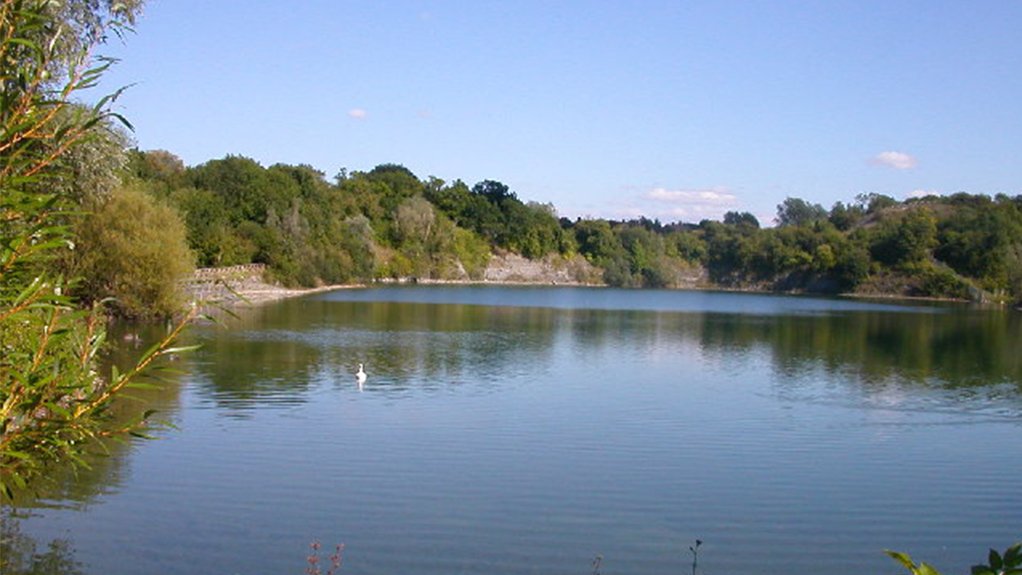Quarries use water, too
This article has been supplied as a media statement and is not written by Creamer Media. It may be available only for a limited time on this website.
For an outsider, water management might not be the first thing that comes to mind when thinking of quarries. However, water availability and wastewater management have been a strong focus for quarrying and mining operators since early 2000s when the states introduced mandatory licences for previously unlicensed water use for quarries.
Restrictions on water extraction from the natural environment have made the recycling of process water a must for quarrying operators. Operators must now compete for licences in fully utilised systems or in rural areas where there are no new water licences available for industry to expand, or where the total licensed extraction is actually being reduced.
Managing process water, reclaim systems, dust suppression and pit dewatering are essential to the success of a sand and aggregates project. By managing these processes efficiently, quarry sites can process more product faster, while lowering their water bill and eliminating the need for double handling.
Most quarries use water in the washing and processing of their products. For example, sand washing, a necessary step for producing high quality sand, utilises both recycled and clear water. Once the sand has been processed, wastewater containing product fines and additional wastewater runoff from the stockpiles make their way to storage or tailings dams. All these water sources need to be managed effectively for the quarry to keep their operational costs under control.
From A to B
“Maintaining the water level balance on site is very important to everyone," explains Darren Van der Westhuizen, Territory Manager for Dewatering at Weir Minerals. “No matter what you’re processing, you’ll always need to move water from point A to point B.”
The new decade has brought to light new problems for fluid transport, from introduction of water restrictions on urban water supplies to climate change affecting the supplies of non-potable groundwater (rainwater, groundwater and stormwater). By transporting and making use of water already available on site, quarries can reduce the cost of water licences and make their investment go further.
“Increased awareness of the positive outcomes achievable with efficient water management provides us the opportunity to partner with customers to explore and develop new and safer water management systems.” says Van der Westhuizen. “We target the challenges the quarries are facing with regards to pumping water around the site with the focus to champion and provide the most optimum solution for each specific and unique application.”
Pumps designed to handle increased suspended solids in water whilst operating at high discharge head pressures could be the answer. With the Warman® DWU pump, Weir Minerals provides a pump built to transport surface water from dams and ponds on site back to the washing circuit for recycling. Other on-site water sources, such as tailings dams, might make better use of a pump house or a customised Multiflo® barge solution.
“There is more than one way to reclaim water at a quarry,” continues Van der Westhuizen. “We engineer our solutions in-house, so no matter the customer’s needs or budget, we can create a custom solution to get the most out of the water they already have on site.”
Closing the loop
In 2020 it’s no longer just about moving water around site, now quarries need to work toward closing the loop of water use in their processes. Regulatory and government bodies around the world have begun implementing guidelines for the management of water in quarries. These guidelines promote site water management proposals founded on the principles of waste minimisation and active promotion of the reduction, reuse and recycling of wastewater.
Steve Barnett, Sand and Aggregates Sales Manager at Weir Minerals, explains, “More and more quarries are looking for equipment that will help them to reduce their water usage on site. With the new guidelines, sites are revaluating their water management plans and seeing how an effective plan and change of equipment can contribute to their success.”
The new planning and allocation of water resources covers reducing, reusing, recycling and recovering water wherever possible. Equipment optimised to handle water not only reduces its losses and boosts efficiency, but also frees up water resources that can be used elsewhere in the process for necessary site duties such as dust suppression. Installing equipment like the Weir Minerals Sand Wash Plant, specifically designed to produce a drier end product, can improve water recovery by up to 35% compared to common sand screw plants.
“We’re out on site with our customers every day. We see how hard they work, and we know how precious each and every recoverable resource is. Installing a custom engineered solution such as the Weir Minerals Sand Wash Plant doesn’t just provide customers with a drier aggregates product after processing but creates a whole new by-product in ready-to-use recycled water.”
The new economy
The conservation of water is a major consideration for a circular economy. As restrictions tighten, quarries are faced with a new question of how to close the loop and get the most from the water available. Weir Minerals’ solutions make it easy to optimise any site for efficient water management. With years of water transport expertise, and a portfolio of products designed to manage water efficiently, the Weir Minerals team works with quarries across the entire process to produce a high quality product while saving time and money, as well as water.
Weir Minerals Africa
Comments
Press Office
Announcements
What's On
Subscribe to improve your user experience...
Option 1 (equivalent of R125 a month):
Receive a weekly copy of Creamer Media's Engineering News & Mining Weekly magazine
(print copy for those in South Africa and e-magazine for those outside of South Africa)
Receive daily email newsletters
Access to full search results
Access archive of magazine back copies
Access to Projects in Progress
Access to ONE Research Report of your choice in PDF format
Option 2 (equivalent of R375 a month):
All benefits from Option 1
PLUS
Access to Creamer Media's Research Channel Africa for ALL Research Reports, in PDF format, on various industrial and mining sectors
including Electricity; Water; Energy Transition; Hydrogen; Roads, Rail and Ports; Coal; Gold; Platinum; Battery Metals; etc.
Already a subscriber?
Forgotten your password?
Receive weekly copy of Creamer Media's Engineering News & Mining Weekly magazine (print copy for those in South Africa and e-magazine for those outside of South Africa)
➕
Recieve daily email newsletters
➕
Access to full search results
➕
Access archive of magazine back copies
➕
Access to Projects in Progress
➕
Access to ONE Research Report of your choice in PDF format
RESEARCH CHANNEL AFRICA
R4500 (equivalent of R375 a month)
SUBSCRIBEAll benefits from Option 1
➕
Access to Creamer Media's Research Channel Africa for ALL Research Reports on various industrial and mining sectors, in PDF format, including on:
Electricity
➕
Water
➕
Energy Transition
➕
Hydrogen
➕
Roads, Rail and Ports
➕
Coal
➕
Gold
➕
Platinum
➕
Battery Metals
➕
etc.
Receive all benefits from Option 1 or Option 2 delivered to numerous people at your company
➕
Multiple User names and Passwords for simultaneous log-ins
➕
Intranet integration access to all in your organisation

























